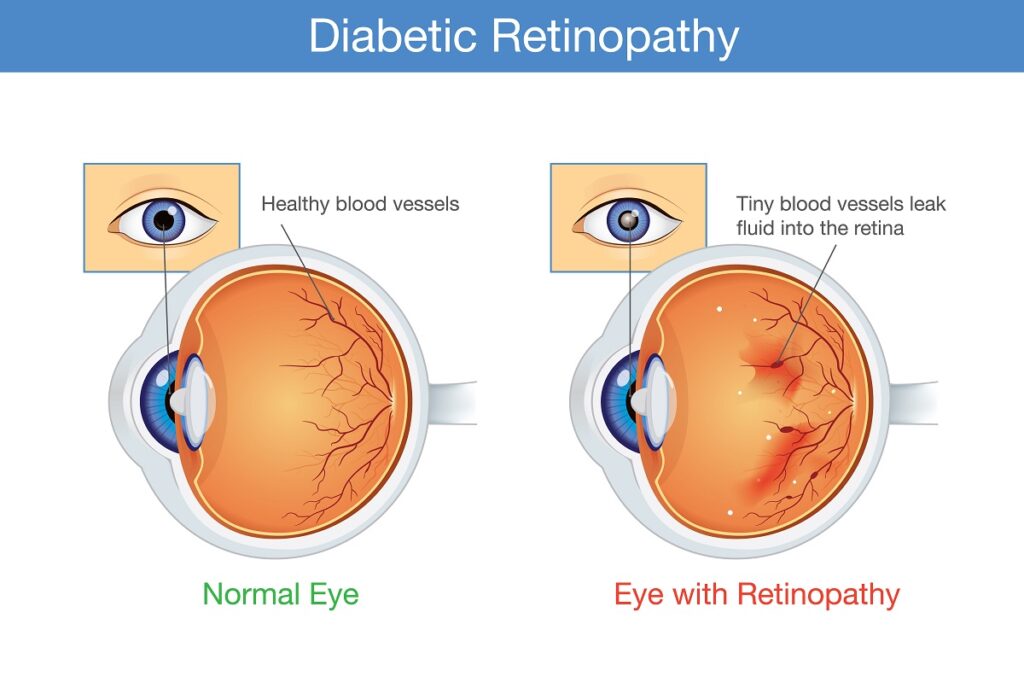
Living with diabetes involves managing various aspects of your health, including your vision. One of the most severe eye conditions related to diabetes is diabetic retinopathy. This condition affects the blood vessels in the retina and can lead to vision loss if not treated promptly.
Dr Soma is a dedicated Midrand ophthalmologist who can help you understand diabetic retinopathy and provide comprehensive care to protect your vision.
What is Diabetic Retinopathy?
Diabetic retinopathy is a complication of diabetes that affects the eyes. It occurs when high blood sugar levels cause damage to the blood vessels in the retina, the light-sensitive tissue at the back of the eye.
Over time, these blood vessels can swell, leak, or even close off completely leading to vision problems. In some cases, abnormal new blood vessels grow on the retina’s surface, further complicating the condition.
What Causes Diabetic Retinopathy?
Understanding the causes of diabetic retinopathy can help you manage your risk factors effectively. Key causes include:
- High Blood Sugar Levels: Consistently high blood sugar levels can damage the blood vessels in the retina.
- Duration of Diabetes: The longer you have diabetes, the higher your risk of developing diabetic retinopathy.
- High Blood Pressure: Hypertension can worsen diabetic retinopathy by increasing the damage to blood vessels.
- High Cholesterol: Elevated cholesterol levels can contribute to the development of retinal blood vessel problems.
- Smoking: Smoking can exacerbate the damage to your eyes and overall health.
What Are the Symptoms of Diabetic Retinopathy?
Recognising diabetic retinopathy symptoms early is crucial for effective treatment. Common symptoms include blurred vision, which varies in severity, floating or dark spots in the field of vision, and fluctuating vision that changes daily. Dark or empty areas indicate vision loss or shadowy regions in the sight. There is also difficulty with colour perception, making it hard to distinguish colours.
How is Diabetic Retinopathy Diagnosed?
If you experience any symptoms of diabetic eye problems, it’s essential to seek immediate attention from an ophthalmologist near me. Diagnosis typically involves:
Comprehensive Eye Exam
- Dilated Eye Exam: Your ophthalmologist will use special drops to widen your pupils, allowing a detailed examination of your retina.
- Optical Coherence Tomography (OCT): A non-invasive imaging test that provides cross-sectional images of the retina to detect any swelling or fluid accumulation.
- Fluorescein Angiography: An imaging test where a dye is injected into your arm, and pictures are taken as the dye travels through the blood vessels in your retina.
What Are the Treatment Options for Diabetic Retinopathy?
Early detection and treatment are vital in managing diabetic retinopathy effectively. Treatment options include:
| Medications | Anti-VEGF Injections:: Medications that reduce the growth of abnormal blood vessels and decrease fluid leakage. |
| Laser Treatment | Focal Laser Treatment: Also known as photocoagulation, this treatment stops or slows the leakage of blood and fluid in the eye. Scatter Laser Treatment: Also known as pan-retinal photocoagulation, this reduces the abnormal blood vessels in the retina. |
| Surgery | Vitrectomy: A procedure that involves removing some of the vitreous gel (gel-like fluid that fills your eye) and blood from the centre of your eye, making it easier for light to focus properly on the retina. |
How Can You Prevent Diabetic Retinopathy?
Preventing diabetic retinopathy involves managing your diabetes effectively and taking proactive steps to protect your vision. Here are some tips:
- Regular Eye Exams: Schedule regular eye exams with your Midrand ophthalmologist to monitor your eye health and catch any issues early.
- Control Blood Sugar Levels: Keep your blood sugar levels within the target range set by your healthcare provider.
- Manage Blood Pressure and Cholesterol: Maintain healthy blood pressure and cholesterol levels through diet, exercise, and medication if necessary.
- Quit Smoking: If you smoke, seek help to quit and reduce your risk of diabetic eye problems.
- Adopt a Healthy Lifestyle: Eat a balanced diet, exercise regularly, and maintain a healthy weight.
Seek Immediate Attention From an Ophthalmologist Near Me
Diabetic retinopathy is a serious condition, but with early detection and proper management, you can protect your vision and maintain a high quality of life.
Dr Soma is a dedicated Midrand ophthalmologist who is here to provide comprehensive care and support every step of the way. If you experience any symptoms of diabetic retinopathy, don’t wait—your vision is vital, and we’re committed to helping you keep it clear and healthy for years to come.
Schedule an eye exam today to ensure your eyes are in the best possible health and to take proactive steps against diabetic retinopathy.